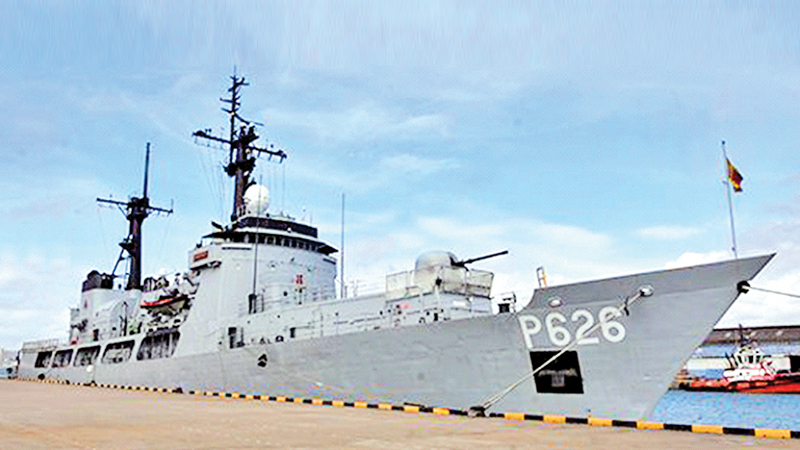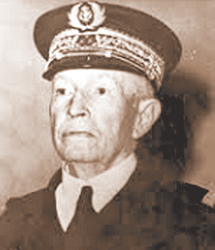Admiral Raoul Castex and small Navies – Some strategic lessons for Sri Lanka
Posted on October 20th, 2024
By Dr. Punsara Amarasinghe (LLB- Colombo, LLM – SAU New Delhı, MA-Moscow )

A Navy contingent is indispensable for islands, being the pinnacle of its security. Navies often resonate with the pride of a country on the one side and simultaneously enable modern states to be much more dominant in global governance.
It is by no means an exaggeration that Alfred Thayer Mahan, the prominent naval strategist advocated for complete supremacy at sea as a vital tool for any country that seeks hegemony over its rivals. The examples Mahan portrayed in his classic text ‘Sea Power’ refer to the triumphs of the Romans and British at sea followed by their emergence to the status of Global superpower. His British counterpart Julian Corbett had a more nuanced approach to Naval strategy than Mahan where Corbett did not only write about complete domination at sea but acknowledged the imperative of involving in joint operations at sea while sustaining maritime communication.
Blue Water Navies

Admiral Raoul Castex
Both Mahan and Corbett were Anglo-American Naval strategists who solemnly stand in the pantheon of the Anglo-American tradition of Blue Water Navies. Perhaps their insight become redundant in inculcating a strategic culture for small Navies where Sri Lanka stands as a classic example. The Sri Lanka Navy was established in 1950 by the Ceylon Navy Act and it played a crucial role in the island’s 30-year civil war. Despite the gallantry shown by the Navy at sea, its current structure gives a realistic picture of the Sri Lankan Navy as a typical example of a small Navy with its five advanced offshore patrol vessels and nine fast attack craft.
When Mahanian or Corbett’s wisdom does not provide salient guidance for small Navies such as the Sri Lankan Navy, one can look beyond the traditional Anglo-American school. The name of Admiral Raoul Castex comes to the fore in searching for such guidance. Yet, his name remains below the periphery or has lurked under the fame of Mahan and Corbett. Perhaps Admiral Raoul Castex was the greatest naval strategist that one has never heard. Castex’s advice for smaller Navies boils down to understanding how best to work with what one has, largely to undermine the adversary Navy’s confidence. He cautioned against seeking decisive battles — a priority for Mahan — and instead counselled what amounted to naval guerrilla warfare. The key for Castex was always seeking to act offensively whenever possible and to engage in constant activity, powered by creativity, within reasonable limits.
Castex and strategies
Raoul Castex was a Frenchman who served his country when French power was eclipsed by the British and the US. Therefore, his analysis of sea power was not coloured by imperial grandeur and it essentially addressed the existential needs of France in the advent of the Second World War.
While serving the French Navy, Castex devoted his time between 1929 to 1939 to author a mammoth work titled, ‘Théories stratégiques’ which depicts the strategic vision that Castex developed as a counter-theory challenging the Mahanian-Corbett’s naval strategies.
His message in ‘Theories Strategiquies’ was an appealing one. By emulating the core of Mahan’s strategy Castex admitted the importance of sea power for any country that aspires to be a global power. Contrary to this axiom developed by Mahan, Castex went one step further as he critiqued the second principle of Mahan’s sea power, which tried to rationalise the idea of crushing the rival’s fleet in the high sea. Castex argued that small Navies can reign at sea along with Blue Water Navies if they prudently adopt their strategic position.
Sea control
Castex argued that sea control or command of the sea, however desirable an ambition, it was always at best relative even for the most powerful Navies. Fleets may control the waters where and when they are present, but then they move on.
Besides, submarines exist. If I have ten submarines and my adversary 50,” he wrote, he does not have mastery, for his submarines in no way prevent mine from circulating in the water.” The implication was that the command of the sea was not the end-all or be-all of Naval strategy. Again, this gives weaker Navies a break: He’s signalling that they need not fret about their inability to impose sea control.
It seems to indicate, that more than a strategist, Raoul Castex provided an aesthetic value for designing certain Naval strategies when he highlighted some concepts such as ‘Manoeuvre’ in a creative manner. For Castex manoeuvering in Naval operation is akin to taking control of events or determining the course of events, to dominate destiny and not abandoning oneself to it, to engender and give birth to facts.
What Castex authored before the Second World War and after the war that small Navies could provide remarkable assistance in building the strength of a small Navy such as the Sri Lanka’s. Mainly one of the prime lessons related to manoeuvre denotes what sort of advancements the Sri Lanka Navy could acquire without a solid fleet.
Naval diplomacy is relatively new among much-celebrated terms such as ‘Naval diplomacy’ and ‘Public diplomacy’. A Naval presence is the basic action in the context of ‘Naval diplomacy’; without its presence, there is no diplomatic effect. Naval diplomacy and presence can cover a range of actions that are not clearly defined from one another and may be engaged in simultaneously. Naval diplomacy fosters partnership among the nations and it leverages the visibility of the sea. Even a country such as Sri Lanka with its small Navy can engage in Naval diplomacy.
Operation Prosperity Guardian
The Sri Lankan Navy’s participation in the Operation Prosperity Guardian last January envisaged the future opportunities that the Sri Lankan Navy can use to augment its status. His insistence on continuous interaction between the Navy and Infantry is another notable merit that a small Navy can adopt in Sri Lanka where land Forces carry the bigger weight in National Security.
One of the most striking features of Admiral Castex’s Naval strategy was its special emphasis on submarines in an era where the use of submarines was not advised by theorists as the centre of gravity.
For the weaker Navies, Cartex introduced a doctrine titled ‘Minor counter offensive’ which dealt with submarines and aircraft. All in all, Admiral Rauel Castex was a man ahead of his time as he aptly forecast how the future of Navies would be.
When the geopolitical dynamics of the Indian Ocean changes with the currents of Sino- Indian rivalry, where the US engages in a proxy war, the use of some of the strategic insights from Admiral Castex would be appropriate for a small Navy is beyond doubt .
The writer is a lecturer at the Department of International Law, Faculty of Law, General Sir John Kotelawala Defence University of Sri Lanka.